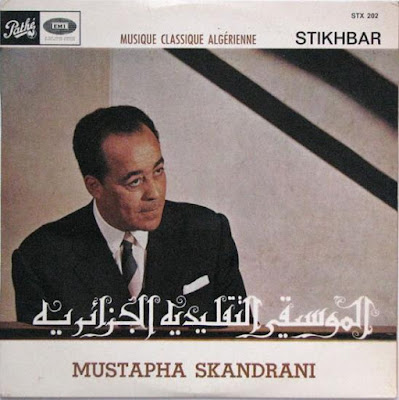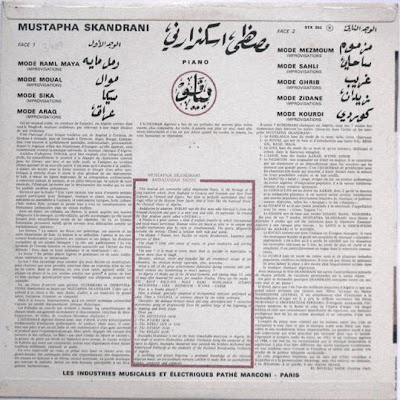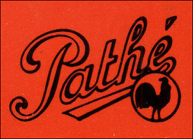

Mustapha Skandrani
Musique Classique Algérienne
Stikhbar LP
Les Industries Musicales Et Electriques Pathé Marconi, Pathé
STX 202, STX 202
1965
a1 Stikhbars: Raml Maya 5:05
a2 Stikhbars: Moual 4:06
a3 Stikhbars: Sika 4:04
a4 Stikhbars: Araq 5:08

b1 Stikhbars: Mezmoum 2:16
b2 Stikhbars: Sahli 4:59
b3 Stikhbars: Ghrib 4:00
b4 Stikhbars: Zidane 4:19
b5 Stikhbars: Kourdi 4:20
Mustapha Skandrani [November 17, 1920 - October, 2005] was a musician, composer, conductor & teacher of Algerian chaâbi of Algiers. Monument to the genre & Andalusian musique, the history of Algerian musique is intimately linked to his personality. It retains its virtuosity of Cheiikh Pianoriental and his compositions are highly appreciated by fans of this music.
Cheikh Mustapha Skandrani was born in the Lower Casbah in Algiers of a family from Cherchell (Tipasa). According to him, his origins are Iskander, a town in Turkey. He grew up and attended school in the ancient Casbah and its winding roads that take us back in Algiers and mysterious magic of another time. The lower part of the Casbah is where he was born near the sea and the port of Algiers & was at the time of the splendor of the city, a major commercial district. There remains today little trace except for a flea market in a bustling shopping ancient streets.
At an early age, Mustapha's uncle Habib Skandrani, noticing his nephew's interest in the piano - an instrument still disregarded by both chaâbi and art music ensembles - took it upon himself to teach him the rudiments. Mustapha has also his uncle to thank for getting interested in such instruments as the mandoline, guitar and kuweitra often heard in the ensembles of that time. He mastered playing them as well as his beloved piano, in no time. Sid-Ali, his father was also a passionate Andalusian music & it was in this atmosphere conducive to music that Mustapha began his musical career in 1938. First with Ahmed Sebti, a master of Andalusian music & then with Hadj M'Rizek, grand master of the song Hawzi who mastered all sorts of musical instruments, such as derbouka, piano, violin, mandolin & was not afraid of promoting the piano as a way to modernize the chaâbi and hawzi genres.
His radio debut was made with the composer and his partner Rasheed Ksentini Marie Soussan. Mahieddine Bachtarzi singer nicknamed "The Caruso of the desert by the French press discovered and hired him to replace the Jewish pianists. This resultedin a major tour of Algeria in 1940 with Oum Kalthoum, Mahieddine Bachtarzi , Driscar, Mustapha Kateb and others. Upon his return from tour, he accompanied all the stars who took part in concerts including Dahmane Ben Achour , El Hadj Menouar and dean of the Chaabi Mohammed El Anka.
In 1939, Mohammed Salah Arzour who was in charge of the musical programmes on the radio, had the first of a series of art music concerts broadcasted. As soon as Mustapha Skandrani had come back to Algiers, he was engaged to accompany, on the piano, such famous singers as: Dahmane Ben Achour, Hadj M'Rizek, Hadj Mahfoud, Hadj Menouar, Bachtarzi Mahieddine and Hadj M'Hamed Elanka.
Then the "Orchestre des sociétés réunies" came into existence with such masters as Ahmed Sebti, Mahieddine Lak'hal, Mohammed Benteffahi, the brothers Fakhardji and their most brilliant pupils; Mustapha Skandrani, at the piano, gave that orchestra the specific 'colour' still found in the way Andalusian music is played today, and thus founded the Andalusian School of Algiers.
In the years 1941 to 1945, he participated in the tours arranged by Mahieddine, entertained the guests of sport clubs, played for audiences at the "Padovani" - the music hall of Algiers - during the month of Ramadan and, on the radio, accompanied such great masters of art music and chaâbi as Elanka, Hadj M'Rizek, Hadj Mahfoud and Dahmane Ben Achour.
In 1945 he accompanied Salim Halali at the great gala performance given at the 'Forum', a public square in central Algiers, and also Lili Boniche at her gala performances in Algiers, Oran and Casablanca.
Besides, Mustapha Skandrani conducted the orchestra of the Algiers opera house every time a new play in Arabic was put on the stage, forty-six in all until 1956.
In 1956 Boudali Safir created the several ensembles of 'Radio Alger'. Mustapha Skandrani was to be in charge of the urban ensemble, conduct the folk music ensemble in the place of M. Elanka, and be the piano soloist of the art music ensemble conducted by M. Fakhardji. This prevailing position on the radio he kept until Algeria was independent. In independent Algeria he can boast of being the greatest Algerian pianist alive despite the fact there are many pianists nowadays. He also goes on conducting both the chaâbi and Andalusian ensembles.
From 1966 -1981, he devoted himself to teaching, taking a class at the Conservatoire d'Algiers. In 1981, Mustapha Skandrani directed the conservatory. Mustapha Skandrani was a master veteran who encouraged his students to the originality and development of their personality & often required them to submit to examinations & competitions with other works than those of the late Mohamed El Anka. Since 1938, Mustapha Skandrani has composed over 300 songs or modern chaabi and 187 compositions and Qasidah songs including 'Youm El Djemaa,' 'El Haraz', 'kifechhilti', 'Qahoua or Latey', 'A bouya Hnin'' filaati wool. He died in October 2005 at his home in Algiers after a long and painful illness. He was 85 & a one of a kind talent. There will never be another brother like him. May his eternal soul rest in peace.
marvelously unique recordings of a singular talent, generously bestowed upon us by an autodidactique musicologue extraordinaire who wishes to remain anonymous. a thousand thanks for this glorious gift. tis indeed a rare & wondrous treasure

No comments:
Post a Comment